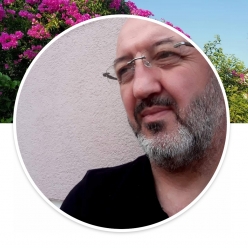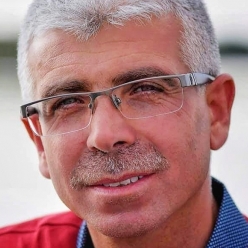- 30 Aralık 2025 - -YENİ- CANLI YAYINDA KONUŞUR GİBİ KONUŞABİLMEK
- 22 Aralık 2025 - -YENİ- MEŞRUİYETİN OLMAZSA OLMAZ 3LÜSÜ
- 15 Aralık 2025 - DİNLE NEYDEN/GÖNÜLDEN
- 08 Aralık 2025 - MEVLANA, HOCA EFENDİ VE DİĞERLERİ
- 24 Kasım 2025 - -YENİ- ACI MI, TATLI MI?
- 17 Kasım 2025 - KÖTÜ KOKU KİMDEN GELİYOR?
- 10 Kasım 2025 - EVDE OTURAN ERKEN ÖLÜR!
- 03 Kasım 2025 - ACIYA/MUSİBETE AĞLAMANIN ETKİSİ
- 27 Ekim 2025 - DİNİN GELECEĞİ
- 20 Ekim 2025 - KENDİ EKSENİ (EGOSU) ETRAFINDA DÖNMENİN USULÜ
- 16 Ekim 2025 - DOĞADAN ALLAHA
- 06 Ekim 2025 - HİÇBİR BAŞARININ BEDELİ ŞEREFİMİZ OLMAMALI!
- 30 Eylül 2025 - SAPANLAR VE SAPITANLARIN AĞIR VEBALİ (NAHL, 16/25)
- 23 Eylül 2025 - EN BÜYÜK ENGELİMİZ: YAZAMAMAK
- 15 Eylül 2025 - YETERLİ VE DENGELİ BİR EĞİTİMLE İKİ KANATLI ÇOCUKLAR!
- 09 Eylül 2025 - MUAYENEYİ REDDEDEN DOKTOR
- 01 Eylül 2025 - STRESTEN NASIL KURTULURUZ?
- 25 Ağustos 2025 - DEMOKRASİ KARANLIKTA ÖLÜR
- 18 Ağustos 2025 - YAŞLANMAKTAN VE YORGUNLUKTAN HIZLI ÇIKIŞ
- 11 Ağustos 2025 - ÖNCE İNCİR/TİN/TATLI; SONRA ZEYTİN/TUZLU (TİN/95/1)
- 04 Ağustos 2025 - ELLERİMİZLE YAPTIĞIMIZ ALTIN KAFESLERİMİZ
- 28 Temmuz 2025 - YÜKSEKÖĞRETİM NASIL YÜKSEK OLUR?
- 21 Temmuz 2025 - DÜNYAYA ÖNCE GELMEK/YAŞLILIK KAZANIM MIDIR?
- 14 Temmuz 2025 - DİVRİĞİYİ GÖRMEDEN ÖLMEYİN!
- 08 Temmuz 2025 - VERİLEN EMRİ YERİNE GETİRMEK
- 03 Temmuz 2025 - AHSEN-İ TAKVİMSİN SEN (S.A.V.)
- 02 Temmuz 2025 - POSTMODERN DÖNEMİN MÜSLÜMANLARA SUNDUĞU FIRSATLAR
- 23 Haziran 2025 - BABANIN GÖLGESİ İYİ BİR ŞEY Mİ?
- 18 Haziran 2025 - ANADOLU MAYASI SÜTÜ YOĞURDA DÖNÜŞTÜRMÜŞTÜR.
- 10 Haziran 2025 - YURT DIŞI KURBANIN BEDELİ NE KADAR OLMALIDIR?
- 02 Haziran 2025 - ERTELEME HASTALIĞI (PROCRASTİNATİON)
- 27 Mayıs 2025 - OĞUZ TÜRKÜ İKİ ATEŞ ALTINDA
- 19 Mayıs 2025 - TÜRKİYE AİLE VAKFI-TAV (ACİL)
- 12 Mayıs 2025 - KISIR DÖNGÜ
- 05 Mayıs 2025 - TOPRAK OLMAYI İSTEMEK!
- 28 Nisan 2025 - YA 3 TLİ (TESPİT-TENKİT-TEKLİF) KONUŞUN, YA DA EBEDİYEN SUSUN!
- 22 Nisan 2025 - ÖLÜMDEN KİM/NİÇİN KORKAR?
- 14 Nisan 2025 - HER KİTABIN ANLAŞILMA REHBERİ TEK BİR KİTAPTIR.
- 10 Nisan 2025 - ZAMAN VE MEKÂNA BAKIŞIMIZ
- 07 Nisan 2025 - KİME KONUŞUYORUZ/YAZIYORUZ?
- 25 Mart 2025 - İYİ FİNAL/YAŞLILIK İÇİN
- 17 Mart 2025 - MİLLİ BİRLİK VE BERABERLİĞİMİZİN 5 KİLOMETRE TAŞI
- 10 Mart 2025 - NEYİ ÇEKİYORSUNUZ? (Rezonans-Çekim Yasası)
- 03 Mart 2025 - ŞEYTANI NE DAVET EDER?
- 24 Şubat 2025 - ŞANLI DEVRİMİ DUYDUNUZ MU?
- 17 Şubat 2025 - AİLE YILINDA KAMU-STK DENGESİ (AİLE VAKFI ÖNERİSİ)
- 10 Şubat 2025 - MİKROFONLA EZAN OKUNURKEN SAĞA/SOLA DÖNÜLÜR MÜ?
- 04 Şubat 2025 - YILDIZ MI, AY MI, KARA DELİK MİSİNİZ?
- 27 Ocak 2025 - FELAKETLERİN İLK ADIMI SUÇLUNUN MASA İLAN EDİLMESİYDİ
- 20 Ocak 2025 - ÜZÜMÜN SAPI, ARMUDUN ÇÖPÜ, MUZUN KABUĞU YENİR Mİ?
- 13 Ocak 2025 - BİZİ KİM DAHA İYİ YIKAR? SU MU, ATEŞ Mİ?
- 07 Ocak 2025 - KAN BAĞIŞI MI? HACAMAT MI?
- 30 Aralık 2024 - KAVGALARIN ASIL SEBEBİ NEDİR?
- 25 Aralık 2024 - VER KORKUYU DEĞİL; VER COŞKUYU
- 17 Aralık 2024 - İMAN-HİKMET-GAYRET-TEVEKKÜL
- 09 Aralık 2024 - ZITLIKLARIN ORTASINDA VASATI BULMAK
- 02 Aralık 2024 - MECELLE PUSULASI (ALTIN FORMÜL İÇERİR)
- 25 Kasım 2024 - ZAHMETTEN KAÇARAK RAHMETE ULAŞILABİLİR Mİ?
- 18 Kasım 2024 - HAK YOK VAZİFE VAR; FERT YOK CEMİYET VAR.
- 11 Kasım 2024 - POLİMAT-ENTELEKTÜEL
- 04 Kasım 2024 - ÖNCE DONANIM (HARDWARE) SONRA YAZILIM (SOFTWARE)
- 28 Ekim 2024 - İBRETLİK BİR ÖLÜMDEN DERS ÇIKARABİLMEK (FETÖ GERÇEĞİ)
- 21 Ekim 2024 - YAŞLANMA SÜREÇ ODAKLI BİR GELİŞMEDİR VE ANNE KARNINDAN BAŞLAR.
- 15 Ekim 2024 - ÜÇÜ BİRLEYEBİLİR MİYİZ? (Türkçülük/İslamcılık/Batıcılık)
- 07 Ekim 2024 - BEYİN-BEYİNCİK-VİCDAN=YASAMA-YÜRÜTME-YARGI
- 30 Eylül 2024 - GEÇMEK Mİ, KALMAK MI?
- 23 Eylül 2024 - METAFOR (MESNEVİ/KABAK METAFORU)
- 10 Eylül 2024 - İDDİALAR VE HIRSLARIMIZIN KUŞATTIĞI HAYATLARIMIZ
- 03 Eylül 2024 - KİTAP VE SİLAH DENGESİ
- 21 Ağustos 2024 - GÖZ BEBEĞİMİZ OLAN DOSTLARIMIZ (!)
- 12 Ağustos 2024 - ÖNCELİKLİ KAYGILARIMIZ
- 06 Ağustos 2024 - SEVGİ-ACI-HZ. İNSAN
- 29 Temmuz 2024 - İNİŞ-ÇIKIŞ-KONFOR
- 22 Temmuz 2024 - GENÇLİĞİN GÜNDEMİNDEKİ KONULARA DAİR: SORU/CEVAP
- 15 Temmuz 2024 - KAPAĞINIZ/DUDAĞINIZ KAPALI MI?
- 09 Temmuz 2024 - SÜLEYMANLAR AYAKTA ÖLÜR.
- 05 Temmuz 2024 - EVLİLİK YAŞI İÇİN 5 N 1 K (HZ. AİŞE ÖRNEĞİ ÜZERİNDEN)
- 25 Haziran 2024 - İNSAN HAYATA NEREDEN BAŞLAMALI ?
- 12 Haziran 2024 - İNSAN NEDEN ALZHEİMER VE DEMANS OLUR?
- 05 Haziran 2024 - SEVİNİNCE TOPRAĞA, ÜZÜLÜNCE GÖKYÜZÜNE BAK!
- 29 Mayıs 2024 - BİR HİKÂYENİZ VAR MI?
- 23 Mayıs 2024 - EN BÜYÜK SÜRPRİZ BİZİ BEKLİYOR OLABİLİR Mİ?
- 13 Mayıs 2024 - MESLEK LİSESİ Mİ, FEN/ANADOLU LİSESİ Mİ? (MÜFREDAT İÇİN)
- 06 Mayıs 2024 - ANAOKULU MU, ÜNİVERSİTE Mİ? (MÜFREDAT İÇİN)
- 29 Nisan 2024 - HARDAL TANESİ
- 22 Nisan 2024 - ÖZELEŞTİRİ Mİ / SAVUNMA MI?
- 08 Nisan 2024 - SİYASETTE ADALET Mİ FAYDA MI?
- 03 Nisan 2024 - YAPAMADIĞIMIZ ŞEYİ ALLAHTAN İSTEMEK!
- 26 Mart 2024 - BUEN VİVİR
- 25 Mart 2024 - BAŞROL DE Mİ OYNUYORSUNUZ, YOKSA FİGÜRAN MISINIZ?
- 13 Mart 2024 - NEHİR AKMALI!
- 12 Mart 2024 - NEHİR AKMALI!
- 05 Mart 2024 - SAYGI DUYMAM GEREKEN BU(!) MU?
- 29 Şubat 2024 - DÜNYA VE AHİRETTE UYUYABİLMEK VE UYANABİLMEK
- 22 Şubat 2024 - OMURGA
- 12 Şubat 2024 - AİLE NEDEN İLK DÜŞMANDIR?
- 09 Şubat 2024 - ANNE/BABA/ÖĞRETMEN ACI BİR TEBESSÜM
- 29 Ocak 2024 - DERDİNİN DEVASI SENSİN
- 23 Ocak 2024 - EŞYANIN RUHU
- 15 Ocak 2024 - ALÇAK GÖNÜLLÜ
- 09 Ocak 2024 - NEDEN UZAKLARI YAKIN, YAKINLARI UZAK ETTİK?
- 01 Ocak 2024 - EN BÜYÜK FESAT NEDİR ?
- 25 Aralık 2023 - İKİNDİ NAMAZI VE BENÎ KURAYZA YAHUDİLERİ
- 18 Aralık 2023 - Kütük Çok Sahibi Yok!
- 12 Aralık 2023 - Fix/Takıntı
- 04 Aralık 2023 - Siyaset ve Tefekkür
- 27 Kasım 2023 - Haddini bil, mutlu ol!
- 20 Kasım 2023 - Korona Döneminin Dijital Çocukları
- 14 Kasım 2023 - Sessizliğin Gücü (Meryem, 19/10)
- 07 Kasım 2023 - Çocuğa Sevgi, Gence Güven ve Yaşlıya Saygı
- 16 Ekim 2023 - Pozitiflik, Saf Pozitiflik midir?
- 12 Ekim 2023 - Gülümseme ve Huzur
- 02 Ekim 2023 - Kabz ve Bast
- 20 Eylül 2023 - Bağınız her daim açık mı?
- 13 Eylül 2023 - Nişanlınız Nasıl Güzel Olur?
- 30 Ağustos 2023 - Helalleşme/Sıfırlama(!?) Mümkün mü?
- 22 Ağustos 2023 - Yalanın Negatif ve Pozitifi
- 17 Ağustos 2023 - Ne yığdırın, ne de bağırtın.
- 07 Ağustos 2023 - Kadife Yumruk (Gerçeğin Gücü)
- 03 Ağustos 2023 - Artırılmış Sanal Hayatın Kurbanları
- 23 Temmuz 2023 - Peygamber Kıssaları ve Çocuk Eğitimi
- 18 Temmuz 2023 - Peygamber Kıssaları ve Çocuk Eğitimi
- 03 Temmuz 2023 - Neredesin Hızır?
- 14 Haziran 2023 - 5 95den Büyüktür. (Çocuk Eğitimi)
- 06 Haziran 2023 - Aile Mahremiyeti ve Nükleer Enerji
- 29 Mayıs 2023 - Talip Olduklarımıza Dikkat!
- 23 Mayıs 2023 - Liderlere Hüsn-i Hâtime İçin 5 Tavsiye
- 15 Mayıs 2023 - Seferoğulları, Tellioğulları ve Yeşil Vadi
- 08 Mayıs 2023 - Ubasute
- 01 Mayıs 2023 - İşiniz Zor mu?
- 10 Nisan 2023 - Niyet-Düşünce-Söylem-Eylem-Amel-Ahlak
- 03 Nisan 2023 - Her Zaman, Her Şeye Rağmen Kazanmak mı?
- 27 Mart 2023 - Faraziye Hayatlar, Şimdi ve Burası
- 20 Mart 2023 - Kifayetsiz Muhterisler, Dış Güçler ve Türkiye Yüzyılı
- 13 Mart 2023 - Sofradaki Çatal (Vasat-Orta Yol)
- 06 Mart 2023 - Hayat; geriye doğru , ileriye doğru
- 20 Şubat 2023 - Sabır; Boyun Eğmek Değil Mücadele Etmektir.
- 13 Şubat 2023 - Deprem - Kenetlenme - Kader - Tedbir
- 08 Şubat 2023 - Köy/Şehir Gerilimi ve Başıboş Köpekler Sorunu
- 31 Ocak 2023 - Akupunktur-İğnelenme-Eleştiri
- 23 Ocak 2023 - Üç Farklı Rüzgârın Anaforundaki Ülkem
- 17 Ocak 2023 - Mehmetleri Fatih Yapmak İçin
- 09 Ocak 2023 - Mevlana, Konevi ve Urmeviyi Anlamak İçin
- 03 Ocak 2023 - Kadın ve Erkek Eş Değerdir.
- 26 Aralık 2022 - Sema bize ne anlatır?
- 20 Aralık 2022 - Kötülük Genini Çıkarabilir miyiz?
- 12 Aralık 2022 - Kimin Uydusuyuz?
- 05 Aralık 2022 - Sağlıklı Birey-Mutlu Aile-Huzurlu Toplum
- 02 Aralık 2022 - Hak ve Hakikat
- 21 Kasım 2022 - Acı Bir Tebessümle Kayan Yıldızlar
- 15 Kasım 2022 - Aile ve Gençlik Çalıştayı

DR. CEMİL PASLI
Nakıs/Noksanlık/İmtihan
Nakıs/Noksanlık/İmtihan
Ana vatanımız cennetti.
Rabbimiz cennette emeğimiz olsun istedi.
Ve cennete göre daha aşağı olan ve isminde de o anlamı taşıyan dünyaya indirdi.
Ve imtihan başladı…
Dünya cennetin benzer ama eksik olarak numunelerini bize sunan noksanlıklarla doldurulmuştu.
O eksiklikleri nasıl tamamlayacağımız Nebiler ve kitaplarla anlatıldı hepimize.
Bir misalle açıklayalım bu hususu:
“Sizi mutlaka korkuyla, açlıkla, (sahip olduğunuz) mallarınızın bir kısmını eksiltmekle (ya da telef etmekle), can kaybına uğratmakla (veya sakatlığa maruz bırakmakla), mahsulünüzü afete uğratmakla (kıtlıkla) imtihan edeceğiz. Sabredenleri müjdele!” (Bakara, 2/155)
Bir Özbek atasözü der ki:
“Elli yaşına ulaşıp ta yataktan kalktığında bir yerin ağrımıyorsa insan değilsin.”
Allah Teâlâ atasözünde anlatılan gerçeğe şu ayetle işaret eder:
“Biz kime uzun ömür verirsek, onu yaratılış itibariyle tersine çeviririz (yaşlandıkça güç ve yeteneklerini azaltır, noksanlarını çoğaltırız). Hala akıllarını kullan (arak bütün bu anlatılanlardan ders al) mayacaklar mı?” Yasin, 36/68.
İnsan ve yaşadığı dünyanın bu noksanlıklarla dolu yapısından dolayı “mükemmel” lik söz konusu değildir.
Bu noktadan “mükemmeliyetçilik” psikiyatri biliminde “obsesyon/takıntı” olarak hastalıklar arasında kabul edilmiştir.
Eskiler bu hakikati şöyle dillendirir:
Bazen hasen (güzel) ahsenden (daha güzel) daha ahsendir. (daha güzeldir)
Öyleyse dünyayı pay ahreti/cenneti payda kabul edelim ve imtihanın çok bilinmeyenli denklemini çözelim.
Ahiretin/Cennetin hesaba katılmadığı hiçbir denklemin çözülemeyeceğini bilelim.
Asıl hayatın ahret hayatı olduğunu, dünya hayatının çok kısıtlı, noksanlıklarla dolu, kısa bir demo dan ibaret olduğunu unutmayalım olur mu?
Embroidery / Deficiency / Test
Our homeland was paradise.
Our Lord wanted us to have labor in heaven.
And he brought it down to the world, which is lower than heaven and has that meaning in its name.
And the test has begun…
The world was filled with deficiencies that presented us with similar but incomplete examples of heaven.
We were all told how to make up for those shortcomings through prophets and books.
Let's explain this with an example:
“We will certainly test you with fear, hunger, loss of (or destruction) of some of your property, loss of life (or injury), and calamity in your crops (famine). Give good news to those who are patient!” (Baqara, 2/155)
An Uzbek proverb says:
“You're not human if you reach the age of fifty and don't have a sore back when you get out of bed.”
Allah indicates the truth described in the proverb with the following verse:
“Whoever we give longevity to, we reverse it by nature (as we get older, we decrease his strength and abilities and increase his shortcomings). Will they still not use their minds (learn from all this)?” Yasin, 36/68.
There is no "perfection" because of the structure of human beings and the world they live in, which is full of these deficiencies.
From this point of view, "perfectionism" has been accepted among the diseases as "obsessions" in the science of psychiatry.
The ancients expressed this truth as follows:
Sometimes hasen (beautiful) is more beautiful than ahsen (better). (it is more beautiful)
So, let's accept the world as the share of the hereafter / heaven in the denominator and solve the equation of the exam with many unknowns.
Let us know that any equation that does not take into account the Hereafter/Heaven cannot be solved.
Let's not forget that the real life is the life of the hereafter, that the life of this world is very limited, full of deficiencies and consists of a short demo, shall we?














Henüz Yorum yok